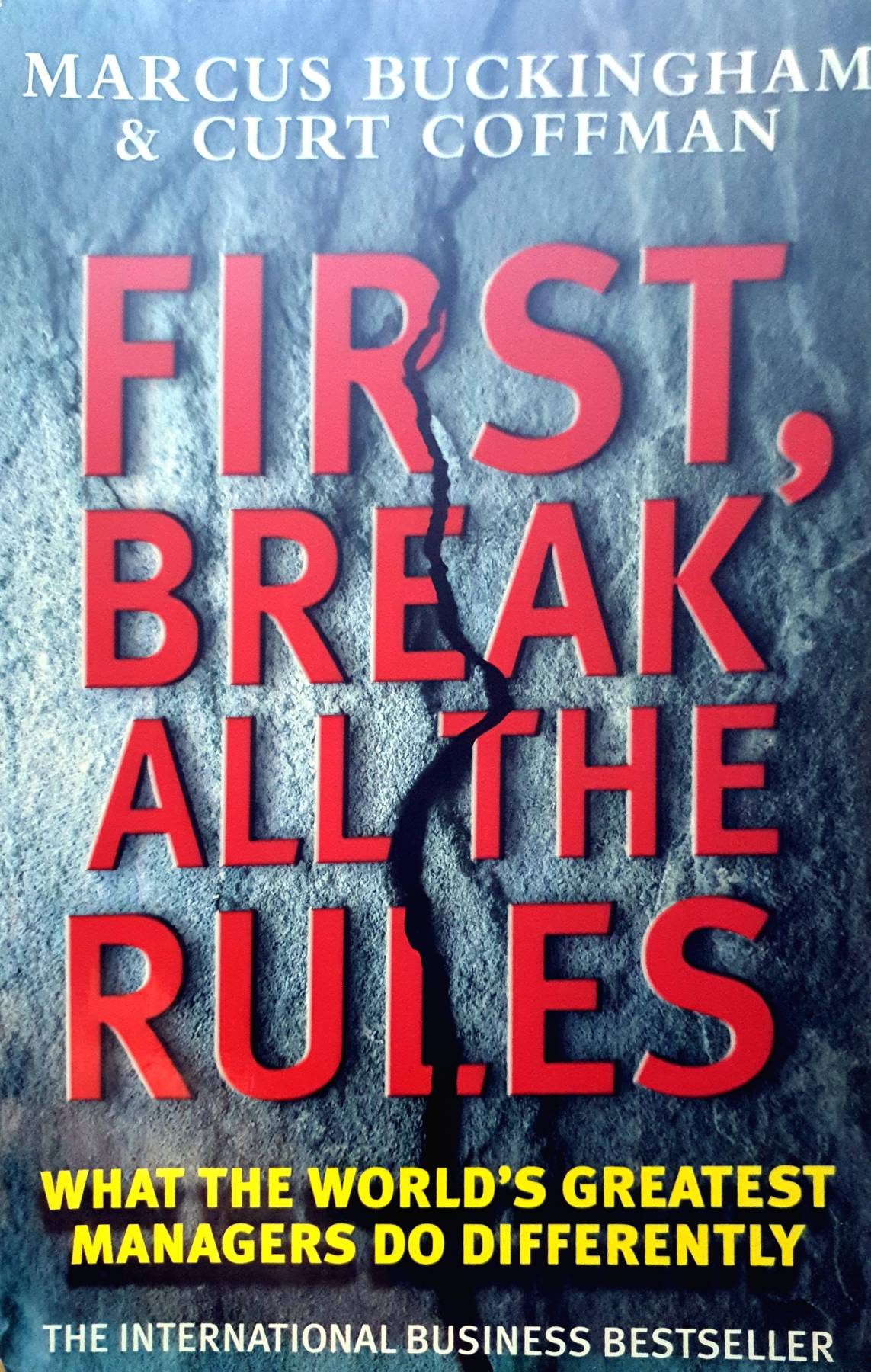สินค้าที่คุณน่าจะชอบ
Business Book Club: First Break All The Rules by Marcus Buckingham and Curt Coffman




| รหัสสินค้า | SKU-31632 |
| หมวดหมู่ | หนังสือ การจัดการ บริหาร ธุรกิจ |
| ราคา | 390.00 บาท |
| สถานะสินค้า | พร้อมส่ง |
| ลงสินค้า | 4 ก.ค. 2567 |
| อัพเดทล่าสุด | 4 ก.ค. 2567 |
| คงเหลือ | 1 ชิ้น |
| จำนวน | ชิ้น |
หยิบลงตะกร้า
รายละเอียดสินค้า
ศูนย์รวมหนังสือเก่าหายาก (Rare Item)
และหนังสือใหม่ (ทุกประเภท) หลากหลายสำนักพิมพ์
หนังสือบางเล่ม " อาจมีราคาสูงกว่าราคาปก " เพราะเป็นหนังสือหายากมีคุณค่า เหมาะแก่การสะสม
ทางร้าน "มีต้นทุนที่สูง ในการจัดหา"
ลูกค้าสามารถ กดสั่งซื้อ หยิบลงตะกร้า (Add To Cart) ก็สั่งซื้อได้ทันที โดยไม่ต้องสมัครสมาชิกให้ยุ่งยาก
มาตรการป้องกันไวรัสโคโรนา (COVID 19) มีมาตรการป้องกันไวรัสโคโรนาอย่างเคร่งครัด เพื่อเพิ่มความปลอดภัยให้กับลูกค้าทุกท่าน พนักงานทำความสะอาดหนังสือทุกเล่มด้วยน้ำยาแอลกอฮอล์ ฆ่าเชื้อโรคและเชื้อไวรัส ห่อถุงพลาสติกอย่างดี ทุกเล่ม
BOOKPANICH
Delivering Happiness
This is the first book for my new Business Book Club, where we’ll be getting together once a month to read and discuss a book about leadership, management and excellence. Suggested questions are provided at the end.
If you work for a large company, the chances are you will have done an employee survey at some point which is based on the research presented in this book, which correlates business performance against employee perceptions based on thousands of surveys conducted by Gallup over the last 20 years. This research found that there are 12 key questions where positive answers strongly correlate with high performing teams within a company – and it’s all about your manager. The questions are organised in order of importance, and the basic task of management is therefore presented as making sure that all employees can answer the first 6 positively (with the remainder being how you motivate your best talent).
Level 1: What do I need to do this role? These two questions are the real essentials. Interestingly, this was illustrated to me last week in a workshop looking at employee engagement in my own company, where our focus was very quickly narrowed down to the working environment, with story after story of colleagues fed up with feeling unable to resolve niggles with tools, vehicles and workplaces which needed sorting out.
1. Do I know what is expected of me at work?
2. Do I have the materials and equipment I need to do my work right?
Level 2: What do I give? What’s my individual contribution and how is that perceived and valued by others?
3. At work, do I have the opportunity to do what I do best every day?
4. In the last seven days, have I received recognition or praise for doing good work?
5. Does my supervisor, or someone at work, seem to care about me as a person?
6. Is there someone at work who encourages my development?
Level 3: Do I belong here? Do my values fit with the wider system and the role I’m trying to fulfil?
7. At work, do my opinions count?
8. Does the mission/purpose of my company make me feel my job is important?
9. Are my co-workers committed to doing quality work?
10. Do I have a best friend at work?
Level 4: How can we all grow, make things better, innovate? The earlier questions are essential to this, because you can only propose ideas which carry any weight if you are focused on the right expectations (Level 1); have confidence in your own expertise (Level 2); and are aware of how your new ideas will be received (Level 3).
11. In the last six months, has someone at work talked to me about my progress?
12. This last year, have I had opportunities at work to learn and grow?
What do great managers do differently?
Following the employee surveys, the researchers conducted thousands of interviews with managers who are considered excellent (based on their results) and those who are simply average to find out what great managers do differently. The key insight is that: People don’t change that much, so select for talent and potential. Don’t waste time trying to put in what was left out, but try to draw out what was left in. That is hard enough.
I really liked the definition of talent, which is not about skills or knowledge but about temperament, for example you can’t train people to work at Disneyland to smile all the time while wearing a Snow White costume. You have to choose people who love being around people and smile all the time anyway. I know a brilliant receptionist who illustrates this point perfectly: she welcomes people into the building or on the phone with a broad smile, is unfailingly polite and helpful and does everything she can to make things work well. But do we reward people for doing their own jobs excellently, or just push them up the hierarchy?



วิธีการชำระเงิน
ชำระเงินผ่านธนาคาร
ชำระเงินด้วยการ Scan QR



ณัทกร อภิรติกุล
094-xxxxxx-4
Accept All Banks | รับเงินได้จากทุกธนาคาร
ค้นหาหนังสือ
Categories
STATISTICS
| หน้าที่เข้าชม | 1,391,132 ครั้ง |
| ร้านค้าอัพเดท | 2 พ.ย. 2568 |
CONTACT US
TRACKCODE
*ใส่ เบอร์มือถือ หรือ email ที่ใช้ในการสั่งซื้อ
เข้าร่วมร้านค้า
ร้านbookpanich
/www.bookpanich.com/
Join เป็นสมาชิกร้าน
237
สมัครสมาชิกร้านนี้ เพื่อรับสิทธิพิเศษ
ระบบสมาชิก
คุณเป็นตัวแทนจำหน่าย
- ระดับ{{userdata.dropship_level_name}}
- ไปหน้าหลักตัวแทน
ระดับสมาชิกของคุณ ที่ร้านค้านี้
รายการสั่งซื้อของฉัน
- ทั้งหมด {{(order_nums && order_nums.all)?'('+order_nums.all+')':''}}
- รอการชำระเงิน {{(order_nums && order_nums.wait_payment)?'('+order_nums.wait_payment+')':''}}
- รอตรวจสอบยอดเงิน {{(order_nums && order_nums.wait_payment_verify)?'('+order_nums.wait_payment_verify+')':''}}
- รอจัดส่งสินค้า {{(order_nums && order_nums.wait_send)?'('+order_nums.wait_send+')':''}}
- รอยืนยันได้รับสินค้า {{(order_nums && (order_nums.wait_receive || order_nums.wait_confirm))?'('+(order_nums.wait_receive+order_nums.wait_confirm)+')':''}}
- รอตรวจสอบข้อร้องเรียน {{(order_nums && order_nums.dispute)?'('+order_nums.dispute+')':''}}
- เรียบร้อยแล้ว {{(order_nums && order_nums.completed)?'('+order_nums.completed+')':''}}
- ทั้งหมด {{(order_nums && order_nums.all)?'('+order_nums.all+')':''}}
- รอการชำระเงิน {{(order_nums && order_nums.wait_payment)?'('+order_nums.wait_payment+')':''}}
- รอตรวจสอบยอดเงิน{{(order_nums && order_nums.wait_payment_verify)?'('+order_nums.wait_payment_verify+')':''}}
- รอจัดส่งสินค้า {{(order_nums && order_nums.wait_send)?'('+order_nums.wait_send+')':''}}
- ส่งสินค้าเรียบร้อยแล้ว {{(order_nums && order_nums.sent)?'('+order_nums.sent+')':''}}
หน้าแรก | วิธีการสั่งซื้อสินค้า | แจ้งชำระเงิน | บทความ | เว็บบอร์ด | เกี่ยวกับเรา | ติดต่อเรา | ตะกร้าสินค้า | Site Map
ณัทกร อภิรติกุล Nuttakorn Apiratikul
ร้านค้าออนไลน์
Inspired by
LnwShop.com (v2)
▲
▼
รายการสั่งซื้อของฉัน
รายการสั่งซื้อของฉัน
ข้อมูลร้านค้านี้

bookpanich
ศูนย์รวมหนังสือเก่าหายาก (Rare Item) และหนังสือใหม่ (ทุกประเภท) หลากหลายสำนักพิมพ์ หนังสือบางเล่ม " อาจมีราคาสูงกว่าราคาปก " เพราะเป็นหนังสือหายาก ทางร้าน "มีต้นทุนที่สูง ในการจัดหา" และต้องใช้้เวลาในการค้นหา ลูกค้าสามารถ กดสั่งซื้อ หยิบลงตะกร้า (Add To Cart) ก็สั่งซื้อได้ทันที สามารถ....ค้นหาชื่อหนังสือ ด้านบน กดตรงแว่นขยาย นโยบายการคืนสินค้า หากลูกค้าไม่พอใจในสินค้า ทางร้านยินดีเป็นอย่างยิ่งที่จะคืนเงินให้ลูกค้าเต็มจำนวน และขออภัยเป็นอย่างยิ่ง กับข้อผิดพลาดที่เกิดขึ้น ลูกค้าสามารถแจ้งคืนได้ภายใน 7 วัน ขอบพระคุณเป็นอย่างสูง
เบอร์โทร : 0947895624
อีเมล : tt2456@hotmail.com
อีเมล : tt2456@hotmail.com
ส่งข้อความติดต่อร้าน
เกี่ยวกับร้านค้านี้
ค้นหาสินค้าในร้านนี้
ค้นหาสินค้า
สินค้าที่ดูล่าสุด
บันทึกเป็นร้านโปรด
Join เป็นสมาชิกร้าน
แชร์หน้านี้
แชร์หน้านี้
↑
TOP เลื่อนขึ้นบนสุด
TOP เลื่อนขึ้นบนสุด
คุณมีสินค้า 0 ชิ้นในตะกร้า สั่งซื้อทันที
สินค้าในตะกร้า ({{total_num}} รายการ)

ขออภัย ขณะนี้ยังไม่มีสินค้าในตะกร้า
ราคาสินค้าทั้งหมด
฿ {{price_format(total_price)}}
- ฿ {{price_format(discount.price)}}
ราคาสินค้าทั้งหมด
{{total_quantity}} ชิ้น
฿ {{price_format(after_product_price)}}
ราคาไม่รวมค่าจัดส่ง
➜ เลือกซื้อสินค้าเพิ่ม












